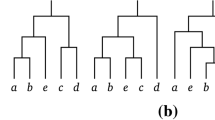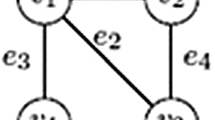Abstract
Can stochastic search algorithms outperform existing deterministic heuristics for the NP-hard problemNumber Partitioning if given a sufficient, but practically realizable amount of time? In a thorough empirical investigation using a straightforward implementation of one such algorithm, simulated annealing, Johnson et al. (Ref. 1) concluded tentatively that the answer is negative.
In this paper, we show that the answer can be positive if attention is devoted to the issue of problem representation (encoding). We present results from empirical tests of several encodings ofNumber Partitioning with problem instances consisting of multiple-precision integers drawn from a uniform probability distribution. With these instances and with an appropriate choice of representation, stochastic and deterministic searches can—routinely and in a practical amount of time—find solutions several orders of magnitude better than those constructed by the best heuristic known (Ref. 2), which does not employ searching.
Similar content being viewed by others
References
Johnson, D. S., Aragon, C. R., McGeoch, L. A., andSchevon, C.,Optimization by Simulated Annealing, An Experimental Evaluation, Part 2: Graph Coloring and Number Partitioning, Operations Research, Vol. 39, pp. 378–406, 1991.
Karmarkar, N., andKarp, R. M.,The Differencing Method of Set Partitioning, Report UCB/CSD 82/113, Computer Science Division, EECS, University of California, Berkeley, California, 1982.
Karp, R. M.,Reducibility Among Combinatorial Problems, Complexity of Computer Computations, Edited by R. E. Miller and J. W. Thatcher, Plenum Press, New York, New York, pp. 85–103, 1972.
Kirkpatrick, S., Gelatt, C. D. Jr., andVecchi, M. P.,Optimization by Simulated Annealing, Science, Vol. 220, pp. 671–680, 1983.
Černy, V.,Thermodynamical Approach to the Traveling Salesman Problem: An Efficient Simulation Approach, Journal of Optimization Theory and Applications, Vol. 45, pp. 41–51, 1985.
Holland, J. H.,Adaptation in Natural and Artificial Systems, University of Michigan Press, Ann Arbor, Michigan, 1975.
Goldberg, D. E.,Genetic Algorithms in Search, Optimization, and Machine Learning, Addison-Wesley, Reading, Massachusetts, 1988.
Davis, L.,Handbook of Genetic Algorithms, Van Nostrand Reinhold, New York, New York, 1991.
Ruml, W.,Stochastic Approximation Algorithms for Number Partitioning, Technical Report TR-17-93, Harvard University, Cambridge, Massachusetts, 1993.
Garey, M. R., andJohnson, D. S.,Computers and Intractability: A Guide to the Theory of NP-Completeness, W. H. Freeman and Company, San Francisco, California, 1979.
Ruml, W., Ngo, J. T., Marks, J., andShieber, S. M.,Easily Searched Encodings for Number Partitioning, Technical Report TR-10-94, Harvard University, Cambridge, Massachusetts, 1994.
Karmarkar, N., Karp, R. M., Lueker, G. S., andOdlyzko, A. M.,Probabilistic Analysis of Optimum Partitioning, Journal of Applied Probability, Vol. 23, pp. 626–645, 1986.
Jones D. R., andBeltramo, M. A.,Solving Partitioning Problems with Genetic Algorithms, Proceedings of the 4th International Conference on Genetic Algorithms, Edited by R. K. Belew and L. B. Booker, Morgan Kaufmann, San Mateo, California, pp. 442–449, 1991.
Papoulis, A.,Probability and Statistics, Prentice Hall, Englewood Cliffs, New Jersey, 1990.
Manderick, B., De Weger, M., andSpiessens, P.,The Genetic Algorithm and the Structure of the Fitnes Landscape, Proceedings of the 4th International Conference on Genetic Algorithms, Edited by R. K. Belew and L. B. Booker, Morgan Kaufmann, San Mateo, California, pp. 143–150, 1990.
Kauffman S. A.,Adaptation on Rugged Fitness Landscapes, Lectures in the Sciences of Complexity, Edited by D. L. Stein, Addison-Wesley, Reading, Massachusetts, pp. 527–618, 1990.
Davis, L.,Job Shop Scheduling with Genetic Algorithms, Proceedings of an International Conference on Genetic Algorithms and Their Applications, Edited by J. J. Grefenstette, pp. 136–140, 1985.
Marks, J., Shieber, S. M., andNgo, J. T.,A Stochastic Search Technique for Graph Bisection, Technical Report TR-94-18, Mitsubishi Electric Research Laboratories, Cambridge, Massachusetts, 1994.
Author information
Authors and Affiliations
Additional information
Communicated by Y. C. Ho
We thank David S. Johnson of AT&T Bell Labs for generously and promptly sharing his test instances. For stimulating discussions, we thank members of the Harvard Animation/Optimization Group (especially Jon Christensen), the Computer Science Department at the University of New Mexico, the Santa Fe Institute, and the Berkeley CAD Group. The anonymous referees made numerous constructive suggestions. We thank Rebecca Hayes for comments concerning the figures. The second author is grateful for a Graduate Fellowship from the Fannie and John Hertz Foundation. We thank the Free Software Foundation for making the GNU Multiple Precision package available.
The research described in this paper was conducted mostly while the third author was at Digital Equipment Corporation Cambridge Research Lab. This work was supported in part by the National Science Foundation, principally under Grants IRI-9157996 and IRI-9350192 to the fourth author, and by matching grants from Digital Equipment Corporation and Xerox Corporation.
Rights and permissions
About this article
Cite this article
Ruml, W., Ngo, J.T., Marks, J. et al. Easily searched encodings for number partitioning. J Optim Theory Appl 89, 251–291 (1996). https://doi.org/10.1007/BF02192530
Issue Date:
DOI: https://doi.org/10.1007/BF02192530




